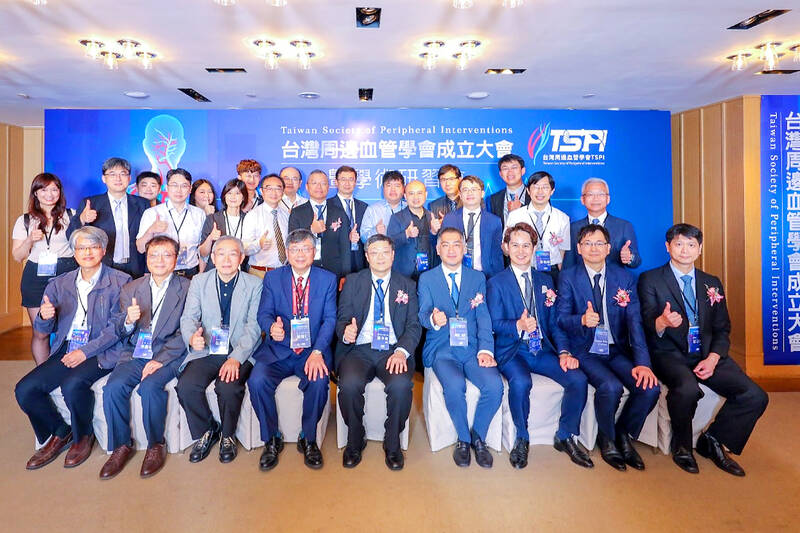Peripheral artery disease (PAD) is often neglected, but awareness of the condition can ensure that people receive proper treatment and avoid amputation, Taiwan Society of Peripheral Interventions (TSPI) chairperson Hsu Chung-ho (徐中和) said yesterday.
Hsu, who is also the director of China Medical University Hospital’s Peripheral Vascular Disease Department, made the remarks at the organization’s inaugural meeting in Taipei.
The TSPI is the first academic organization to focus on medical research of PAD in Taiwan, Hsu said, adding that it aims to enhance expertise and clinical practices, introducing advanced cardiovascular interventional technology to the nation.

Photo courtesy of TSPI
PAD has long been neglected in Taiwan, he said, adding that many patients seek medical treatment with several doctors for sores or wounds on their feet or legs that were not healing, or for coldness, numbness or weakness in the lower leg or foot, but doctors do not realize they might be caused by PAD, delaying diagnoses.
Many people with chronic PAD try different medications with no effect, and eventually have to undergo amputation, but if they are diagnosed earlier and received proper treatment to open or bypass artery blockages, they could avoid amputation, he said.
The meeting was attended by interdisciplinary physicians, including former National Taiwan University Hospital Yunlin branch superintendent Hwang Juey-jen (黃瑞仁), as well as several Japanese cardiologists, including former Japan Endovascular Treatment Conference executive committee chairman Osamu Iida, Tatsuya Nakama and Masahiko Fujihara.
Because Japan and Taiwan have aging societies with similar social environments, genetic features and a high prevalence of diabetes, Iida said that he hopes the Japan Endovascular Treatment Conference and TSPI can share clinical data and experiences, cooperating to improve treatments for people with PAD in both countries.
Most medication to treat PAD is based on data provided by Western countries, but there are some genetic differences between Asians and people from the West, Hsu said, adding that a Japanese and Taiwanese collaboration could develop PAD treatment guidelines specific to Asians.
Asian adults are generally less resistant to insulin, less effective at absorbing blood sugar and have a higher prevalence of diabetes, Hwang said, adding that people with diabetes have a higher risk of atherosclerosis — a hardening of arteries, and a main cause of PAD — so they should take an Ankle Brachial Index test every year to assess vascular status and check for PAD.
People with signs of acute limb ischemia — a sudden decrease in blood flow to a limb — can be assessed with the “five Ps” — pain, pulse, paresthesia (a numb or tingling sensation), pallor and paralysis, he said, adding that people with diabetes should take an Ankle Brachial Index test regularly.

An essay competition jointly organized by a local writing society and a publisher affiliated with the Chinese Communist Party (CCP) might have contravened the Act Governing Relations Between the People of the Taiwan Area and the Mainland Area (臺灣地區與大陸地區人民關係條例), the Mainland Affairs Council (MAC) said on Thursday. “In this case, the partner organization is clearly an agency under the CCP’s Fujian Provincial Committee,” MAC Deputy Minister and spokesperson Liang Wen-chieh (梁文傑) said at a news briefing in Taipei. “It also involves bringing Taiwanese students to China with all-expenses-paid arrangements to attend award ceremonies and camps,” Liang said. Those two “characteristics” are typically sufficient

A magnitude 5.9 earthquake that struck about 33km off the coast of Hualien City was the "main shock" in a series of quakes in the area, with aftershocks expected over the next three days, the Central Weather Administration (CWA) said yesterday. Prior to the magnitude 5.9 quake shaking most of Taiwan at 6:53pm yesterday, six other earthquakes stronger than a magnitude of 4, starting with a magnitude 5.5 quake at 6:09pm, occurred in the area. CWA Seismological Center Director Wu Chien-fu (吳健富) confirmed that the quakes were all part of the same series and that the magnitude 5.5 temblor was

The brilliant blue waters, thick foliage and bucolic atmosphere on this seemingly idyllic archipelago deep in the Pacific Ocean belie the key role it now plays in a titanic geopolitical struggle. Palau is again on the front line as China, and the US and its allies prepare their forces in an intensifying contest for control over the Asia-Pacific region. The democratic nation of just 17,000 people hosts US-controlled airstrips and soon-to-be-completed radar installations that the US military describes as “critical” to monitoring vast swathes of water and airspace. It is also a key piece of the second island chain, a string of

The Central Weather Administration has issued a heat alert for southeastern Taiwan, warning of temperatures as high as 36°C today, while alerting some coastal areas of strong winds later in the day. Kaohsiung’s Neimen District (內門) and Pingtung County’s Neipu Township (內埔) are under an orange heat alert, which warns of temperatures as high as 36°C for three consecutive days, the CWA said, citing southwest winds. The heat would also extend to Tainan’s Nansi (楠西) and Yujing (玉井) districts, as well as Pingtung’s Gaoshu (高樹), Yanpu (鹽埔) and Majia (瑪家) townships, it said, forecasting highs of up to 36°C in those areas